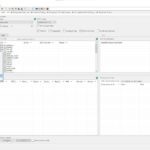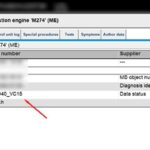Is DTS Monaco required for coding ECUs not supported by Vediamo, like very new modules? Yes, DTS Monaco is often necessary when Vediamo lacks support for newer ECUs. DTS-MONACO.EDU.VN offers in-depth resources and training to master this powerful tool. Unlock advanced car coding and diagnostic capabilities with DTS Monaco, and let’s explore its use, advantages, and how it stands out as a crucial tool for automotive technicians and car enthusiasts.
Contents
- 1. What is DTS Monaco and Why is it Essential for Modern ECU Coding?
- 2. Vediamo vs. DTS Monaco: Understanding the Key Differences
- 3. Why DTS Monaco is Necessary for Coding Very New ECUs
- 4. Step-by-Step Guide: Using DTS Monaco for ECU Coding
- 5. Overcoming Common Challenges in ECU Coding with DTS Monaco
- 6. The Benefits of Professional Training for DTS Monaco Users
- 7. Real-World Applications: Success Stories with DTS Monaco
- 8. Staying Updated: The Latest Trends in ECU Coding
- 9. Choosing the Right DTS Monaco Package for Your Needs
- 10. Ensuring Safety and Compliance: Best Practices for ECU Coding
- FAQ: Frequently Asked Questions About DTS Monaco and ECU Coding
- Conclusion: Embrace the Power of DTS Monaco for Advanced ECU Coding
1. What is DTS Monaco and Why is it Essential for Modern ECU Coding?
DTS Monaco (Diagnostic Tool Set for Monaco) is a sophisticated software used for diagnostics, ECU flashing, and car coding in modern vehicles. It stands out as an essential tool because it offers comprehensive capabilities for vehicle communication, diagnostics, and modifications beyond the reach of more basic tools.
- Advanced Functionality: DTS Monaco allows users to perform tasks such as flashing ECUs (Electronic Control Units), variant coding (adjusting vehicle functions), and advanced diagnostics that are often unavailable in standard diagnostic tools.
- Manufacturer-Level Access: The software provides access levels comparable to those used by vehicle manufacturers, enabling deep-level customization and problem-solving.
DTS Monaco is especially crucial for coding newer ECUs that are not supported by older software like Vediamo. As automotive technology evolves, newer ECUs incorporate advanced features and security measures that require sophisticated tools like DTS Monaco to access and modify. According to a study by the National Institute for Automotive Service Excellence (ASE), technicians who are proficient in using advanced diagnostic tools like DTS Monaco are better equipped to handle complex vehicle issues and provide comprehensive services.
2. Vediamo vs. DTS Monaco: Understanding the Key Differences
While both Vediamo and DTS Monaco are used for automotive diagnostics and ECU coding, they cater to different needs and offer distinct capabilities. Understanding their differences is key to choosing the right tool for the task.
| Feature | Vediamo | DTS Monaco |
|---|---|---|
| User Interface | Complex, geared towards developers | More user-friendly, designed for technicians |
| Functionality | Primarily for engineering and development | Broad range including diagnostics, flashing, and coding |
| ECU Support | Supports older ECUs but lacks newer protocols | Comprehensive support for newer ECUs and protocols |
| Ease of Use | Requires extensive technical knowledge | Easier to learn and use with guided workflows |
| Target Audience | Automotive engineers and developers | Automotive technicians and coding specialists |
Vediamo is often used in the development phase of ECUs, while DTS Monaco is tailored for workshop and service applications. DTS Monaco’s user-friendly interface and broader functionality make it a better choice for technicians needing to perform complex coding and diagnostics on a variety of vehicles. For instance, many modern vehicles now use Ethernet-based diagnostics (DoIP), which is well-supported by DTS Monaco but not by Vediamo.
3. Why DTS Monaco is Necessary for Coding Very New ECUs
Newer ECUs come with advanced security features, complex software architectures, and updated communication protocols. DTS Monaco is equipped to handle these challenges, making it an indispensable tool for coding very new modules.
- Advanced Protocols: New ECUs often use Controller Area Network Flexible Data-Rate (CAN FD) and Automotive Ethernet for faster and more reliable communication. DTS Monaco supports these protocols, whereas Vediamo may not.
- Security Access: Modern vehicles incorporate advanced security measures to prevent unauthorized access and modifications. DTS Monaco can handle security access procedures, allowing technicians to perform necessary coding and adaptations.
- Software Updates: New ECUs frequently require software updates to fix bugs, improve performance, or add new features. DTS Monaco allows technicians to flash ECUs with the latest software versions, ensuring optimal performance.
According to Bosch Automotive Service Solutions, the complexity of modern automotive systems requires diagnostic tools that can handle advanced communication protocols and security measures. DTS Monaco’s ability to manage these complexities makes it essential for coding new ECUs effectively.
4. Step-by-Step Guide: Using DTS Monaco for ECU Coding
Using DTS Monaco for ECU coding involves a series of steps that need to be followed carefully to ensure successful and safe modifications. Here’s a detailed guide to get you started:
-
Initial Setup:
- Install DTS Monaco software on your computer.
- Connect your diagnostic interface (e.g., SD Connect C4/C5) to your computer and vehicle.
- Ensure that the interface is properly configured and recognized by DTS Monaco.
-
Workspace Configuration:
- Open DTS Monaco and create a new workspace for your vehicle.
- Import the necessary ECU data files (SMR-d files) for the ECUs you want to code.
- Verify that all logical links are correctly set up.
-
Establishing ECU Connection:
- Select the ECU you want to code from the list of logical links.
- Right-click on the ECU and select “New Tab for Logical Link” to open a dedicated tab for that ECU.
- Ensure a stable connection to the ECU.
-
Bypassing the Firewall:
- Modern vehicles have firewalls to prevent unauthorized access. You need to bypass these firewalls before coding.
- Navigate to “Generic Jobs” and select the appropriate security access level (e.g., “Security Access Level 37” or “Security Access Level 3B”).
- Click “Transmit” and verify that you receive an “acknowledged” response without any red text.
-
Variant Coding:
- Go to the “Variant Coding” tab and select your ECU.
- Choose the domain and fragment that contain the feature you want to modify.
- Double-click the value under “Meaning” to open a dropdown menu with available options.
- Select the new value and click “Do Coding”.
- Verify that the coding process completes successfully with the bar reaching 100% and the new value displayed.
-
Making Coding Permanent:
- After coding, you need to make the changes permanent by synchronizing the ECU to non-volatile memory.
- Go to “Diagnostic Services” and find “[31] Synchronize to Non-volatile Memory Start”.
- Click “Transmit” and verify the “acknowledged” response.
- Next, click “[31] Synchronize to Non-volatile Memory Results” and click “Transmit”.
- Perform a hard reset of the ECU by turning off the vehicle, opening the driver’s door, waiting a few minutes, and then restarting the vehicle.
-
Verification:
- Log back into the ECU and verify that the new values are active and functioning as expected.
Note: This is a general guide. Always refer to the specific vehicle’s service manual and coding guidelines. For visual learners, DTS-MONACO.EDU.VN offers video tutorials and hands-on training sessions to help you master each step.
5. Overcoming Common Challenges in ECU Coding with DTS Monaco
ECU coding can be complex, and you may encounter various challenges. Here’s how DTS Monaco can help overcome them:
| Challenge | DTS Monaco Solution |
|---|---|
| Firewall Issues | DTS Monaco provides specific routines to bypass firewalls, ensuring that you can access the ECU for coding. Make sure to follow the correct security access levels for your vehicle model. |
| Communication Errors | Ensure that your diagnostic interface is properly connected and configured. Check the ECU data files (SMR-d files) for compatibility. Use the “Test Communication” feature in DTS Monaco to diagnose connection problems. |
| Incorrect Coding Values | Always refer to the vehicle’s service manual and coding guidelines to determine the correct coding values. Double-check your selections before performing the coding. Back up the original coding settings before making any changes. |
| ECU Compatibility | Verify that DTS Monaco supports the specific ECU you are trying to code. Use the latest version of DTS Monaco to ensure compatibility with newer ECUs. Contact DTS-MONACO.EDU.VN for support with specific ECU compatibility issues. |
| Software and Firmware Updates | Keep your DTS Monaco software and diagnostic interface firmware up to date. These updates often include bug fixes, improved performance, and support for new ECUs. DTS-MONACO.EDU.VN provides the latest updates and support to keep your system current. |
According to a survey by the Equipment and Tool Institute (ETI), technicians who use updated software and follow recommended procedures experience fewer coding errors and improved success rates. Regularly updating your DTS Monaco software and seeking expert guidance from DTS-MONACO.EDU.VN can significantly reduce these challenges.
6. The Benefits of Professional Training for DTS Monaco Users
While DTS Monaco is more user-friendly than some other diagnostic tools, professional training can significantly enhance your proficiency and confidence. Here are some key benefits:
- Expert Knowledge: Training courses provide in-depth knowledge of DTS Monaco’s features, functions, and best practices.
- Hands-On Experience: Practical exercises and real-world examples allow you to apply what you’ve learned in a controlled environment.
- Troubleshooting Skills: Expert instructors can teach you how to diagnose and resolve common issues encountered during ECU coding.
- Certification: Completing a certified training program can enhance your credibility and demonstrate your expertise to employers and clients.
- Networking Opportunities: Training courses provide opportunities to connect with other technicians and coding specialists, sharing knowledge and experiences.
DTS-MONACO.EDU.VN offers comprehensive training programs designed to equip you with the skills and knowledge needed to excel in ECU coding. Our courses cover everything from basic setup to advanced coding techniques, ensuring that you can handle any coding task with confidence.
7. Real-World Applications: Success Stories with DTS Monaco
DTS Monaco has helped numerous automotive technicians and enthusiasts achieve remarkable results. Here are a few success stories:
- Retrofitting Features: A technician used DTS Monaco to retrofit adaptive cruise control (ACC) on a vehicle that didn’t originally come with the feature. By coding the ECU with the appropriate settings, the technician successfully enabled ACC, enhancing the vehicle’s safety and convenience.
- Performance Tuning: An enthusiast used DTS Monaco to fine-tune the engine control unit (ECU) of their sports car, optimizing performance and improving throttle response. The enthusiast was able to achieve significant gains in horsepower and torque by adjusting various engine parameters.
- Diagnosing Complex Issues: A workshop used DTS Monaco to diagnose an intermittent electrical issue that was affecting multiple systems in a vehicle. By analyzing ECU data and performing advanced diagnostics, the technicians were able to identify a faulty sensor and resolve the issue quickly.
- Customizing Vehicle Settings: A car owner used DTS Monaco to customize various vehicle settings, such as interior lighting, seat memory functions, and display preferences. This allowed the owner to personalize their vehicle to their exact liking.
These stories highlight the versatility and power of DTS Monaco in various automotive applications. With the right training and expertise, you can achieve similar results and unlock the full potential of your vehicle.
8. Staying Updated: The Latest Trends in ECU Coding
The field of ECU coding is constantly evolving, with new technologies and techniques emerging regularly. Staying updated with the latest trends is crucial for maintaining your skills and delivering top-notch service.
- Over-the-Air (OTA) Updates: Many modern vehicles now support OTA updates, allowing manufacturers to remotely update ECU software. Understanding how these updates work and how they affect coding is essential.
- Cybersecurity Measures: As vehicles become more connected, cybersecurity is increasingly important. Staying informed about the latest security vulnerabilities and how to protect against them is crucial.
- Artificial Intelligence (AI) in Diagnostics: AI is being used to develop advanced diagnostic tools that can analyze vehicle data and identify potential issues more accurately. Familiarizing yourself with these tools can improve your diagnostic capabilities.
- Electric Vehicle (EV) Coding: With the growing popularity of EVs, understanding how to code and diagnose EV ECUs is becoming increasingly important. This includes coding battery management systems, motor controllers, and charging systems.
DTS-MONACO.EDU.VN provides regular updates, articles, and training sessions to keep you informed about the latest trends in ECU coding. Our resources can help you stay ahead of the curve and provide cutting-edge services to your clients.
9. Choosing the Right DTS Monaco Package for Your Needs
DTS Monaco is available in various packages, each offering different features and capabilities. Choosing the right package depends on your specific needs and budget.
| Package | Features | Target Audience |
|---|---|---|
| Basic | Includes basic diagnostics, ECU identification, and fault code reading. | Hobbyists and DIY enthusiasts |
| Standard | Adds variant coding, flashing, and basic adaptation capabilities. | Automotive technicians and small workshops |
| Professional | Includes advanced coding, security access, and support for newer protocols (e.g., CAN FD, DoIP). | Coding specialists and large workshops |
| Ultimate | Offers the most comprehensive features, including access to manufacturer-level data and support. | Automotive engineers and specialized coding centers |
| Custom Packages | Tailored to meet specific needs, offering a flexible combination of features and support. | Individuals and organizations with unique requirements or specialized projects |
Consider your current skill level, the types of vehicles you work on, and the specific coding tasks you need to perform when choosing a DTS Monaco package. DTS-MONACO.EDU.VN can help you assess your needs and recommend the best package for your situation.
10. Ensuring Safety and Compliance: Best Practices for ECU Coding
ECU coding can have significant impacts on vehicle performance and safety. Following best practices is crucial to ensure safe and compliant modifications.
- Backup Original Settings: Always back up the original ECU settings before making any changes. This allows you to revert to the original configuration if something goes wrong.
- Follow Service Manuals: Refer to the vehicle’s service manual and coding guidelines for specific instructions and recommended procedures.
- Use Reliable Data: Use reliable and verified data files (SMR-d files) for coding. Avoid using unofficial or unverified data, as it may contain errors or malware.
- Verify Compatibility: Verify that the coding changes are compatible with the vehicle’s hardware and software. Incompatible coding can lead to malfunctions or damage.
- Test Thoroughly: After coding, test the vehicle thoroughly to ensure that the changes are functioning as expected and that there are no adverse effects.
- Stay Compliant: Ensure that your coding activities comply with local regulations and standards. Some modifications may be illegal or void the vehicle’s warranty.
According to the Society of Automotive Engineers (SAE), following best practices and using reliable data are essential for ensuring the safety and reliability of ECU coding. DTS-MONACO.EDU.VN provides resources and training to help you adhere to these best practices and maintain a high standard of safety and compliance.
FAQ: Frequently Asked Questions About DTS Monaco and ECU Coding
-
What is ECU coding?
ECU coding is the process of modifying the software in a vehicle’s electronic control units (ECUs) to enable or customize features.
-
Is DTS Monaco difficult to learn?
While DTS Monaco has a more user-friendly interface than some other diagnostic tools, professional training is recommended to master its advanced features.
-
Can I use DTS Monaco on any vehicle?
DTS Monaco supports a wide range of vehicles, but compatibility may vary depending on the specific model and ECU. Check the software documentation for compatibility information.
-
Do I need special hardware to use DTS Monaco?
Yes, you need a compatible diagnostic interface (e.g., SD Connect C4/C5) to connect your computer to the vehicle’s ECU.
-
Can ECU coding void my vehicle’s warranty?
Yes, certain ECU coding modifications may void your vehicle’s warranty. Check with your vehicle manufacturer or dealer for more information.
-
How often should I update my DTS Monaco software?
Regularly updating your DTS Monaco software is recommended to ensure compatibility with the latest vehicles and ECUs, as well as to benefit from bug fixes and performance improvements.
-
Is it safe to perform ECU coding myself?
ECU coding can be risky if not performed correctly. Professional training and following best practices are essential to ensure safety and compliance.
-
Where can I find reliable SMR-d files for DTS Monaco?
Reliable SMR-d files can be obtained from official sources, such as vehicle manufacturers or authorized data providers. Avoid using unofficial or unverified files.
-
What are the benefits of using DTS Monaco over other diagnostic tools?
DTS Monaco offers advanced functionality, comprehensive ECU support, and a user-friendly interface, making it a powerful tool for ECU coding and diagnostics.
-
Does DTS-MONACO.EDU.VN offer support for DTS Monaco users?
Yes, DTS-MONACO.EDU.VN offers comprehensive support for DTS Monaco users, including training courses, troubleshooting assistance, and software updates.
Conclusion: Embrace the Power of DTS Monaco for Advanced ECU Coding
DTS Monaco is a powerful tool that opens up a world of possibilities for automotive technicians and enthusiasts. Whether you’re looking to retrofit features, optimize performance, diagnose complex issues, or customize vehicle settings, DTS Monaco can help you achieve your goals. By investing in professional training, staying updated with the latest trends, and following best practices, you can harness the full potential of DTS Monaco and excel in the field of ECU coding.
Ready to take your ECU coding skills to the next level? Visit DTS-MONACO.EDU.VN today to explore our comprehensive training programs, software packages, and support services. Unlock the power of DTS Monaco and transform your automotive expertise.
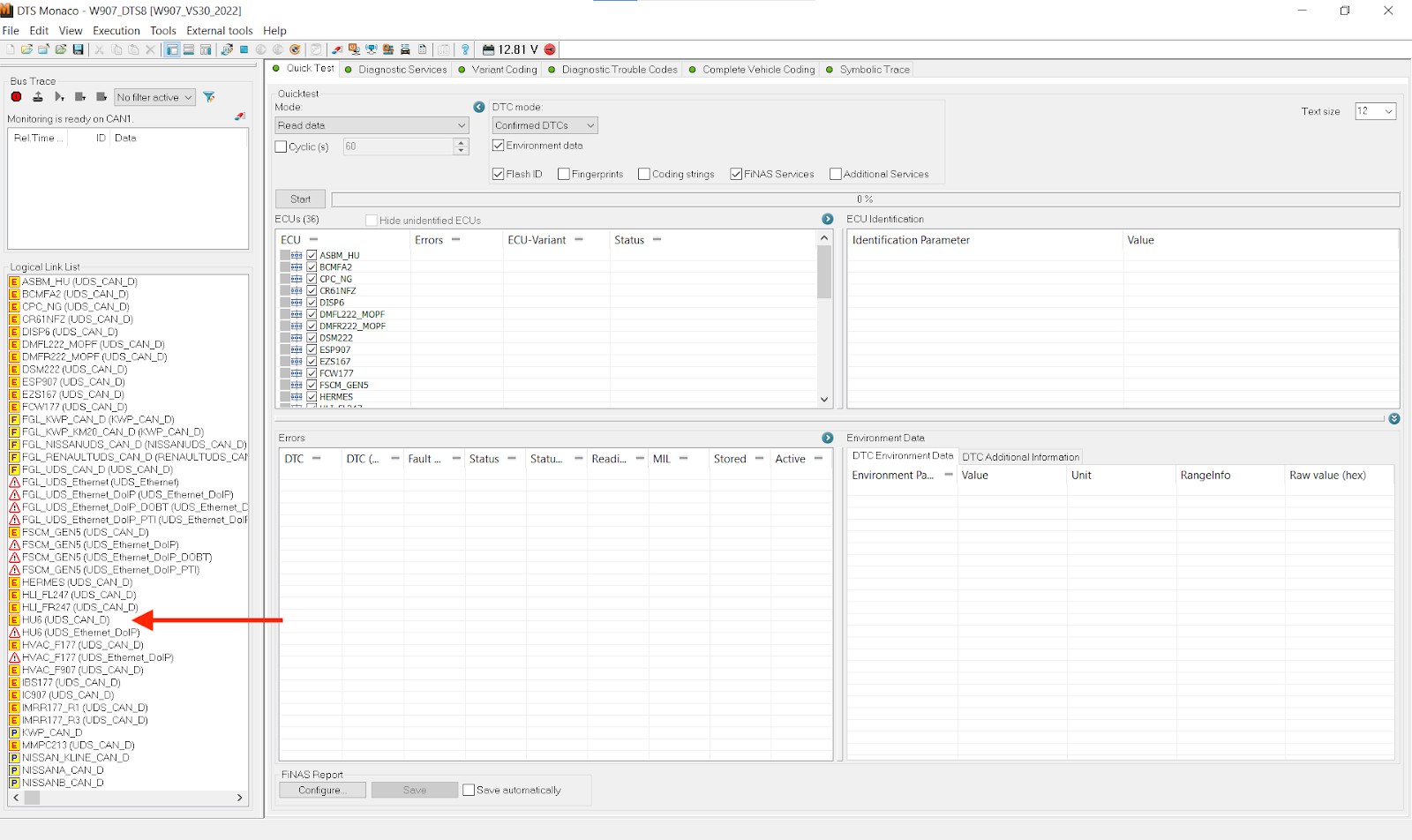 DTS Monaco Workspace Interface with ECU Selection
DTS Monaco Workspace Interface with ECU Selection
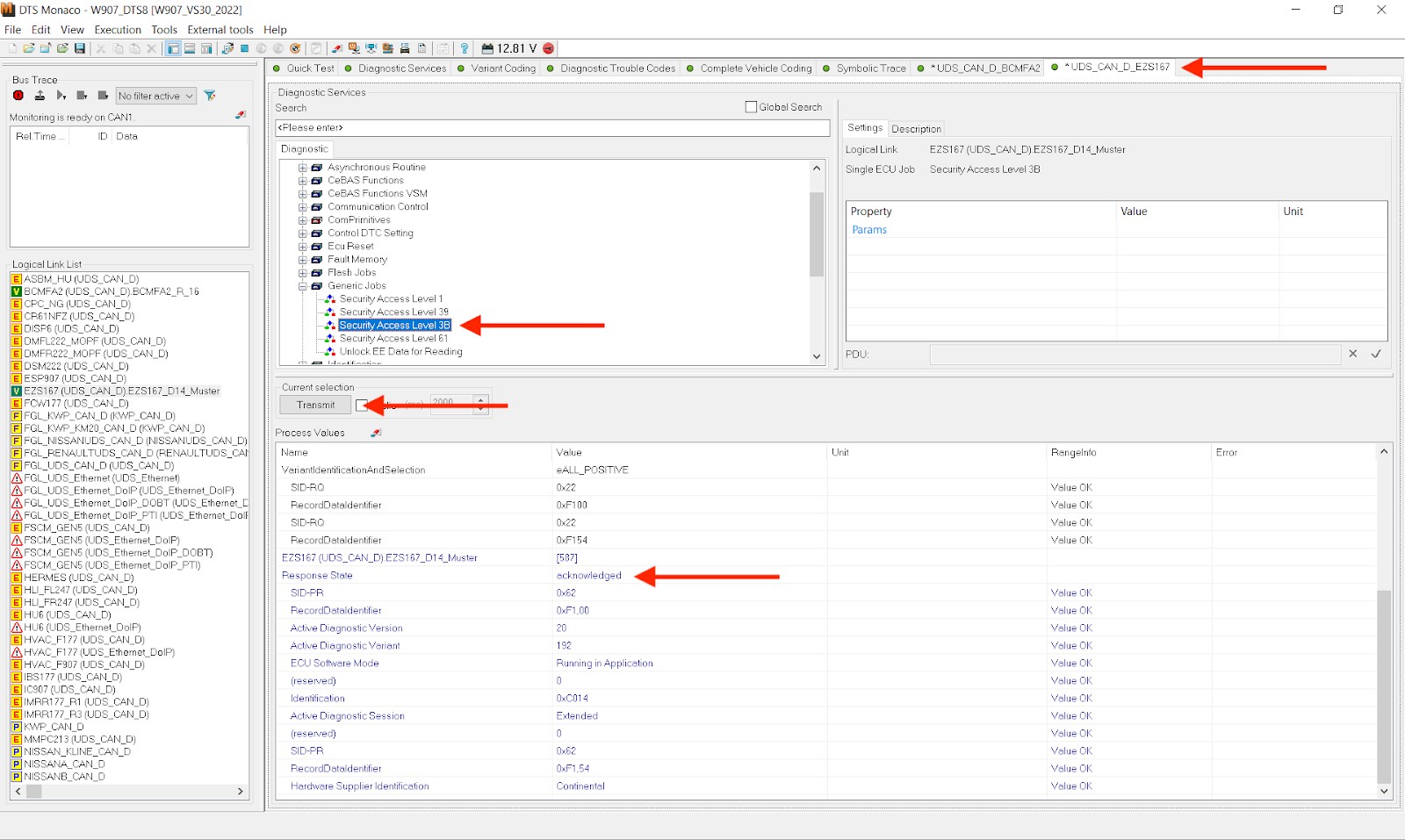 DTS Monaco Security Access Level Selection
DTS Monaco Security Access Level Selection
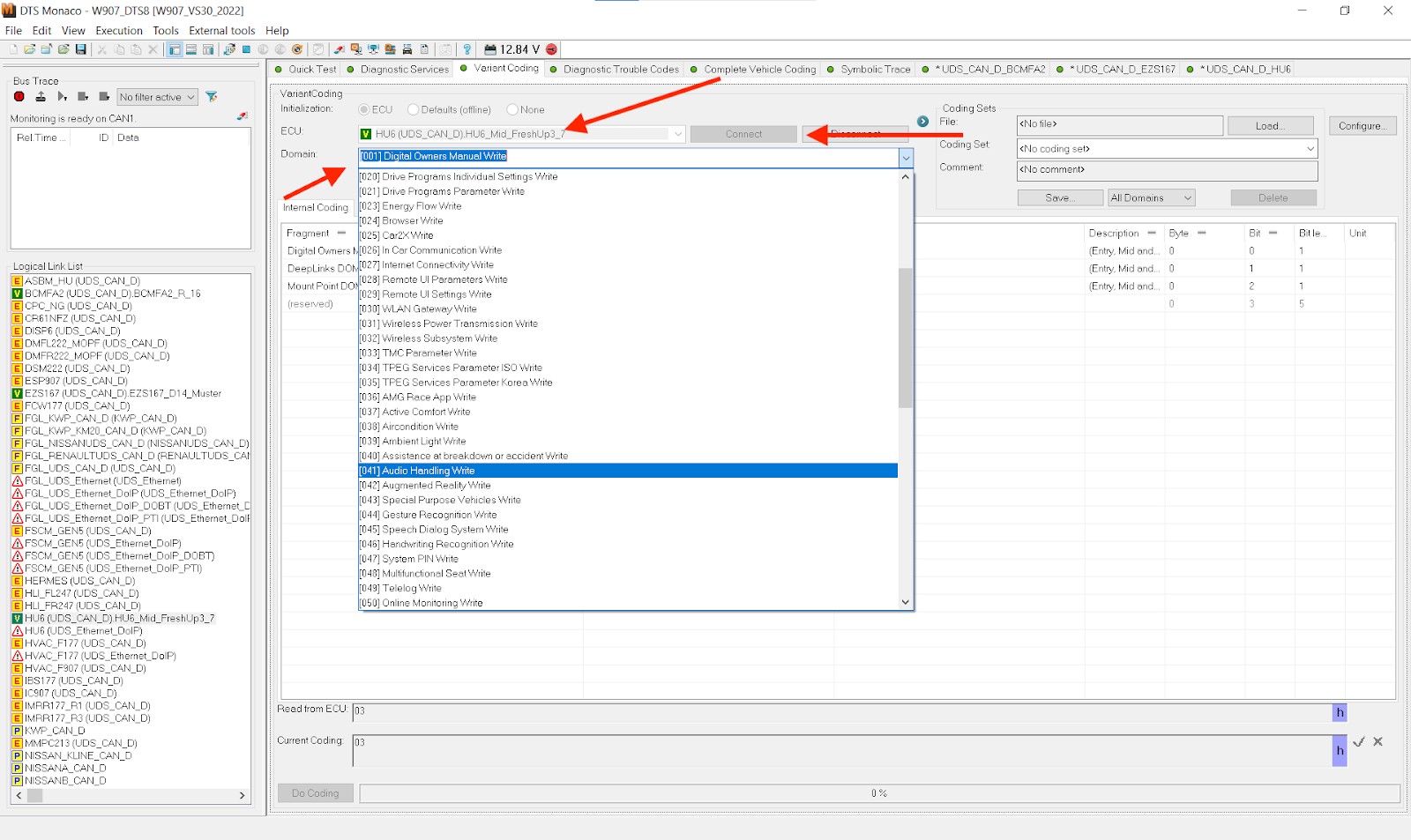 DTS Monaco Variant Coding Tab
DTS Monaco Variant Coding Tab
Address: 275 N Harrison St, Chandler, AZ 85225, United States
Whatsapp: +1 (641) 206-8880
Website: DTS-MONACO.EDU.VN
